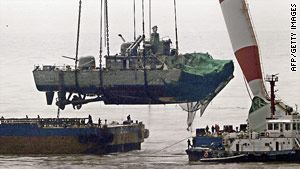The US state department says there "will definitely be consequences" for North Korea following the sinking of a South Korean warship in March.
The North is facing international condemnation after investigators blamed it for the sinking of the ship, in which 46 sailors died.
Pyongyang has rejected the claim as a "fabrication" and threatened war if sanctions were imposed.
China urged restraint and did not criticise the North.
The report - by a team including experts from the US, Australia, Britain and Sweden - concluded that a torpedo had sunk the Cheonan corvette.
The investigators said parts of the torpedo found on the sea floor had lettering that matched a North Korean design.
READ THE REPORT IN FULL
Most computers will open PDF documents automatically, but you may need Adobe Reader
Excerpts: Ship sinking report"Clearly this was a serious provocation by North Korea and there will definitely be consequences," said US State Department spokesman PJ Crowley.
The US has some 28,000 troops stationed in the South following the 1950-53 Korean War.
Defence Secretary Robert Gates said the US was in "close consultation" with South Korea, which would decide what action to take.
South Korean President Lee Myung-bak has pledged to take "stern action".
Britain, Australia and Japan also expressed anger at North Korea. UN Secretary General Ban Ki-moon said the report was "deeply troubling".
'All-out war'Pyongyang has said it would send its own inspection team to the South, to "verify material evidence" behind the accusation.
NORTH KOREAN ATTACKS
- Jan 1967 - attacks South Korean warship near border, killing 39 sailors
- Jan 1968 - commandos storm presidential palace in Seoul in a failed attempt to kill President Park Chung-hee
- Jan 1968 - captures USS Pueblo - one crew member dies and 82 held hostage for 11 months
- Dec 1969 - hijacks South Korean airliner taking dozens of passengers hostage
- Oct 1983 - bombs hotel in Rangoon, Burma in failed attempt to kill South Korean President Chun Doo-hwan - 21 people die
- Nov 1987 - bombs South Korean airliner, killing 115
- Sept 1996 - North Korean submarine crew land in South, sparking deadly manhunt
- Mar 2010 - torpedoes Cheonan warship, 46 sailors killed
A North Korean defence spokesman said the country would "respond to reckless counter-measure with an all-out war of justice", the state KCNA news agency reported.
Chinese foreign ministry spokesman Ma Zhaoxu said Beijing had "noted" the report and would also make its own assessment, but called on both sides to exercise restraint.
South Korea's Vice-Minister of Foreign Affairs, Chun Young-woo, said Seoul was considering taking the matter to the UN Security Council.
"The Security Council will consider what is necessary as a response to North Korea's act of aggression," he told the BBC. "North Korea cannot get away from this."
The Cheonan went down near the disputed inter-Korean maritime border, raising tension between the two nations which technically remain at war.
Earlier, a number of explanations had been suggested for the sinking - including an accidental collision with an unexploded sea mine left over from the Korean War.


 The shattered wreck of the Cheonan was winched to the surface in two pieces
The shattered wreck of the Cheonan was winched to the surface in two pieces


